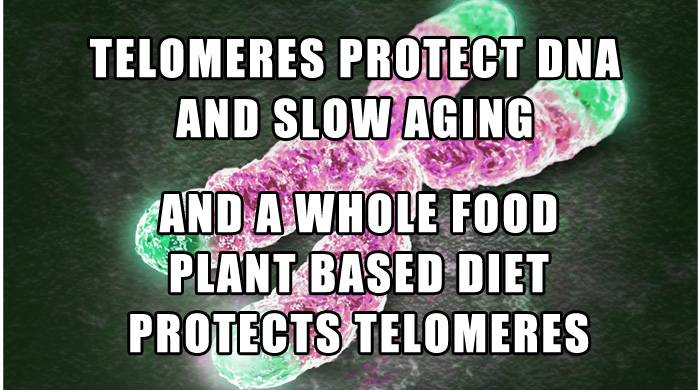Telomeres And Aging – Slow Cellular Aging With A Plant Based Diet

Telomeres and Aging
Telomeres are caps at the ends of chromosomes and are involved in the aging of cells, cell death, and the development of cancer and other diseases.[1]
The caps are sections of DNA that are compared to the plastic tips on shoelaces. Telomeres keep the DNA of chromosomes from unraveling like the plastic tips of shoelaces protect the tips of shoelaces from fraying.
Telomeres keep the genetic data intact, and they also allow the cells to divide into new cells containing the same DNA as the replicated cell.
Aging occurs because telomeres become shorter each time a cell divides and once the telomeres reach a certain length the cell cannot divide, leading the degradation of the cell, cell death, or the transformation into cancer cells.
This process is also associated with other disorders including dyskeratosis congenita, aplastic anemia, and pulmonary fibrosis.
Telomere shortening and aging are inevitable but certain factors can either speed telomere shortening or protect against it and lengthen the lifespan of a cell and a person.
Lifestyle Factors, Telomere Shortening, and Aging
Lifestyle factors such as diet and exercise have been shown to either increase or decrease telomere shortening. Better choices of diet and regular exercise have been shown to significantly reduce the rate of telomere shortening, delay age-related disease, and increase lifespan.[2]
Factors That Shorten Telomeres and Speed Aging
Oxidative stress plays a major part in damaging DNA, shortening of telomeres and aging. Oxidative stress occurs when there isn’t enough antioxidants in the body to neutralize free radicals.
Free radicals are oxygen molecules that have a free electron which can steal and electron from DNA, proteins, or fat and damage molecules they come in contact with.[3] Not all free radicals are bad and some kill pathogens and microbes.[4]
Antioxidants are molecules that are able to donate electrons to free radicals, stabilizing the free radicals without becoming destabilized themselves.
Though the body produces antioxidants most antioxidants come from the foods we eat and these antioxidants come from plants. Increasing plant consumption increases protection against oxidative stress, DNA damage, telomere shortening, and aging of cells.
- Smoking is associated shortened telomere length[5] and the increased dosage with greater shortening of telomeres.[6,7] The oxidative stress smoking causes damages DNA and telomeres.
- Obesity causes oxidative stress and damages DNA and shortens telomeres.[8,9] A Western or Standard American Diet (SAD) is high in animal protein and fat, and the key to lengthening the life of cells may be avoiding saturated animal fat.[10]
- Stress reduces the level of antioxidant proteins[11] leading to increased oxidative damage to DNA,[12] the shortening of telomeres,[13] and aging.
Science Shows A Whole Food Plant-Based Diet is Most Protective Against Telomere Shortening and Aging
Better dietary choices, weight-loss, and exercise have been implicated in protecting against telomere shortening and aging, but a comparison of the Dean Ornish study[14] and the C. Mason study [15] paints a picture that clearly implicates a plant-based diet as the primary telomere protector.
The Ornish study was able to significantly protect telomeres in just 3 months with lifestyle changes.
“Lifestyle modifications included a low-fat (10% of calories from fat), whole foods, plant-based diet high in fruits, vegetables, unrefined grains, legumes, and low in refined carbohydrates; moderate aerobic exercise (walking 30 min/day, 6 days/week)”
The question remained, “Were all three equally responsible for the significant telomere and age protection, or was one factor more responsible than another?”
A comparison of the Ornish study and the C. Mason study clearly implicated a plant-based diet being primarily responsible for the telomere protection. 400 hundred women were randomized into 4 groups: a control group, calorie restricted group, exercise group, and an exercise and calorie restricted.
The diet consisted of the average SAD diet, but with portion controls. At the end of one year the test groups lost weight, but the exercise and the weight-loss offered no telomere benefit. The Ornish group which ate a plant based diet, exercised, and lost weight did see a significant telomere benefit.
It was the removal of consumption of animal protein and fat and the saturation of the body with vitamins, minerals, and antioxidant phytonutrients from plants that was able to protect the telomeres against shortening and cell aging.
[1] Telomeres
[2] Telomeres, lifestyle, and cancer
[3] B N Ames, M K Shigenaga, et al. Oxidants, antioxidants, and the degenerative diseases of aging. Proc. Natl. Acad. Sci. U.S.A. 1993;90:7915-7922.
[4] What is Oxidative Stress?
[5] Song Z, von Figura G, Liu Y, et al. Lifestyle impacts on the aging-associated expression of biomarkers of DNA damage and telomere dysfunction in human blood. Aging Cell. 2010;9:607–615.
[6] McGrath M, Wong JY, Michaud D, et al. Telomere length, cigarette smoking, and bladder cancer risk in men and women. Cancer Epidemiol Biomarkers Prev. 2007;16:815–819.
[7] Morlá M, Busquets X, Pons J, et al. Telomere shortening in smokers with and without COPD. Eur Respir J. 2006;27:525–528.
[8] Valdes AM, Andrew T, Gardner JP, et al. Obesity, cigarette smoking, and telomere length in women. Lancet. 2005;366:662–664.
[9] Furukawa S, Fujita T, Shimabukuro M, et al. Increased oxidative stress in obesity and its impact on metabolic syndrome. J Clin Invest. 2004;114:1752–1761.
[10] J H Ford. Saturated fatty acid metabolism is key link between cell division, cancer, and senescence in cellular and whole organism aging. Age (Dordr). 2010 Jun;32(2):231-7.
[11] Patel R, McIntosh L, McLaughlin J, et al. Disruptive effects of glucocorticoids on glutathione peroxidase biochemistry in hippocampal cultures. J Neurochem. 2002;82:118–125.
[12] Irie M, Asami S, Ikeda M, Kasai H. Depressive state relates to female oxidative DNA damage via neutrophil activation. Biochem Biophys Res Commun. 2003;311:1014–1018.
[13] Von Zglinicki T. Oxidative stress shortens telomeres. Trends Biochem Sci. 2002;27:339–344.
[14] D Ornish, J Lin, J Daubenmier, G Weidner, E Epel, C Kemp, M J M Magbanua, R Marlin, L Yglecias, P R Carroll, E H Blackburn. Increased telomerase activity and comprehensive lifestyle changes: a pilot study. Lancet Oncol. 2008 Nov;9(11):1048-57.
[15] C Mason, R Risques, L Xiao, C R Duggan, I Imayama, K L Campbell, A Kong, K E Foster-Schubert, C Y Wang, C M Alfano, G L Blackburn, P S Rabinovitch, A McTiernan. Independent and combined effects of dietary weight loss and exercise on leukoctye telomere length in postmenopausal women. Obesity (Silver Spring). 2013 Dec;21(12):E549-54.







